Out at the Olympics
What could the record representation of LGBTQ+ athletes at Tokyo 2020 help to achieve?
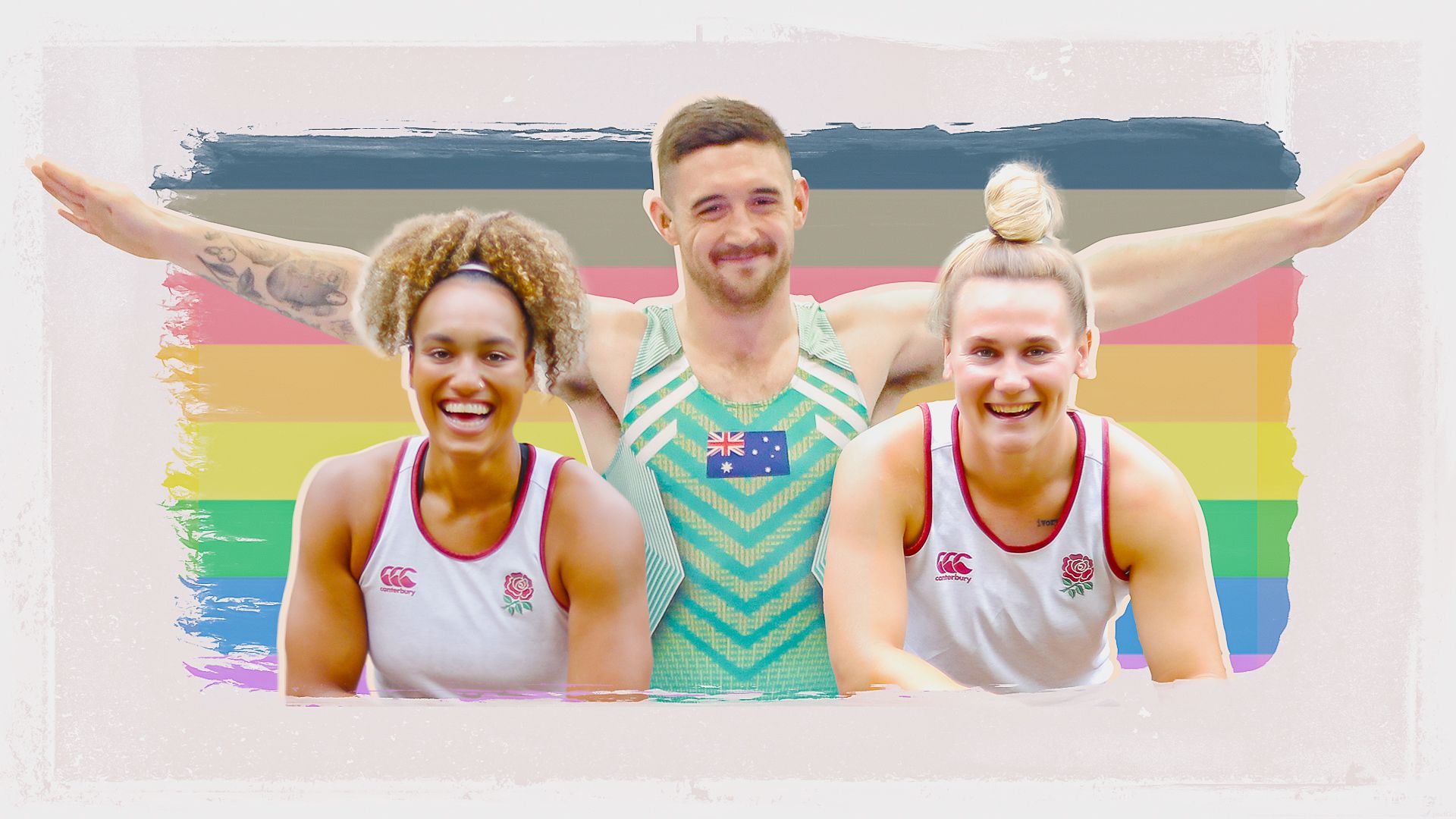
The joy of just being in Tokyo - after so much uncertainty and an extra year of pre-tournament training - is evident on the faces of GB rugby sevens stars Meg Jones and Celia Quansah.
They are beaming with enthusiasm, and to be there together as a couple as well as team-mates gives them an extra burst of pride.
Jones says the British women's sevens challenge at these Olympics will be an underdog story. "Everyone loves that! We've got nothing to lose. We're ranked seventh in the world, and there's a huge belief in the camp that's driving us," she tells Sky Sports, speaking alongside Quansah in the shade of the stand at Todoroki Stadium. It's Russian opposition first up in their opener on Thursday and the team is raring to go.
They have been impressed with the meticulous preparations, the Covid-safe precautions, and the increasing intensity of training. Representing their country means so much. Representing as LGBTQ+ athletes and role models has a special significance too.
"It's so important," explains Quansah. "It shows we're moving in the right direction, and with the work everyone is doing outside of sport - such as on social media and talking to friends and family - people are becoming more comfortable. We'll keep being proud to be us."
Celia Quansah and Meg Jones tell Sky Sports News' Geraint Hughes why LGBTQ+ visibility at Tokyo 2020 matters
Celia Quansah and Meg Jones tell Sky Sports News' Geraint Hughes why LGBTQ+ visibility at Tokyo 2020 matters
At the time of writing, over 160 athletes who are LGBTQ+ and out are participating at Tokyo 2020 - that's already nearly three times as many as competed at Rio 2016. Outsports.com, which has celebrated the achievements of lesbian, gay, bi and trans people in sports for over two decades, tracks this aspect of athlete visibility at major sporting events. For these Olympic Games - and more than ever before - LGBTQ+ athletes are individually requesting to be added to the website's latest list.
Jones says this surge in self-confidence is "phenomenal" - but what is its wider impact, and in terms of the Tokyo legacy, how can change be channelled constructively?
"That's what we're striving for, right? As much representation as possible. I can only see that rising..."
Meg Jones, Team GB rugby sevens
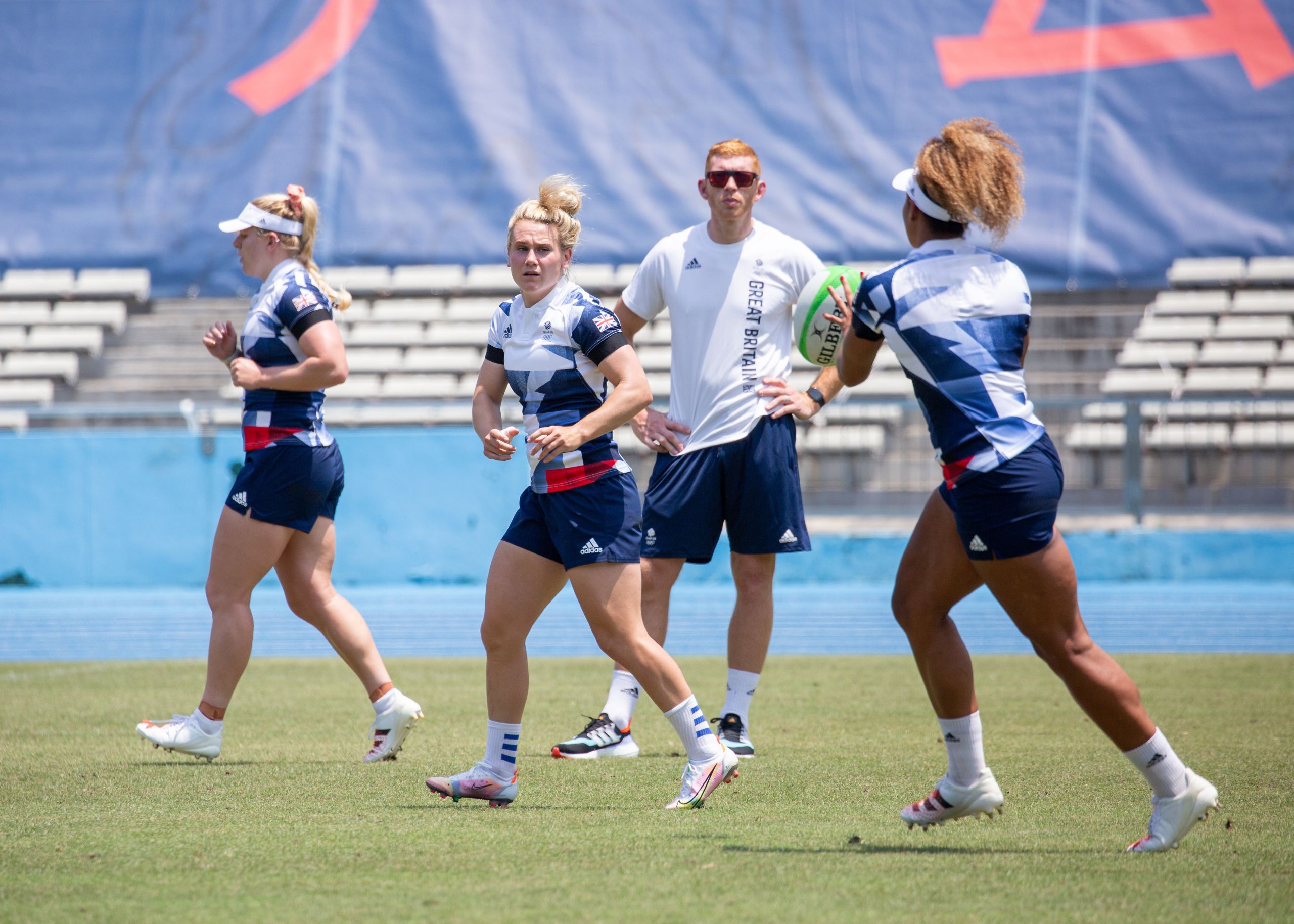
The Aussie gymnast getting a bonus bounce
Like Jones and Quansah, trampoline gymnast Dom Clarke is at his first Olympics and he shares many of their emotions - a sense of slight disbelief that the Games are happening at all, the buzz of pre-event excitement, and the pride that accompanies selection by your country. The Australian is grateful to have had that extra year - "I used it to get stronger, jump higher, and learn new skills" - and he's vowing to put on a show.
With no GB entrants in the men's competition, he's set to pick up some additional support from these shores, having been born in Plymouth. "My family's actually Kiwi - we moved around a lot when I was young. I started gymnastics in Brisbane then moved back to Sydney in 2004. But I do hold a British passport!"
The 24-year-old is a Pride Ambassador for Gymnastics NSW and he contacted Outsports to suggest they might like to add him to their list, particularly because male athletes are relatively under-represented - they make up only about 10 per cent of the overall tally thus far. "In every single aspect of my athletic career now, I try to be as authentic as I can," he tells Sky Sports via Zoom from his Tokyo hotel room. There have been moments on his sporting journey when he was not sure that would be possible.
Clarke watched on TV as Matthew Mitcham won diving gold at Beijing 2008 and would regularly see Ji Wallace - silver medallist in trampoline at Sydney 2000 - while training. Both were Australian role models as athletes, and they are also out gay men.
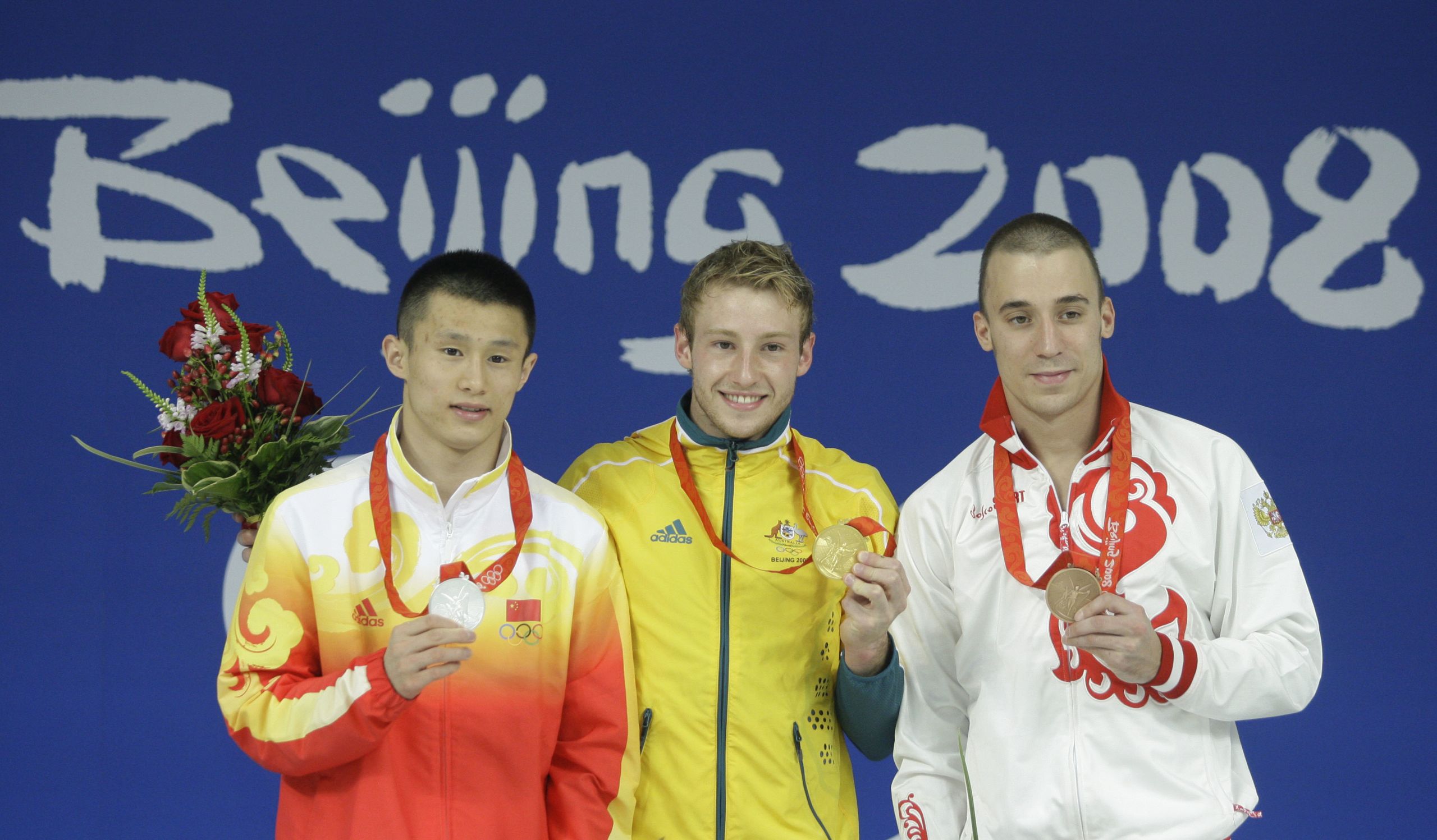
Australia's gold-medal winning diver Matthew Mitcham (c) with China's Liang Huo and Russia's Gleb Galperin at the Beijing 2008 Olympics (AP Photo/Sergey Ponomarev)
Australia's gold-medal winning diver Matthew Mitcham (c) with China's Liang Huo and Russia's Gleb Galperin at the Beijing 2008 Olympics (AP Photo/Sergey Ponomarev)
"My coach back then actually coached Matt when he used to do trampoline, so she would tell us these great stories about him. Ji has always been very comfortable in himself - you'd see him shirtless at the gym in these fluoro pink training shorts! As a gymnast, I was lucky to have that.
"But it was kind of challenging too. These two boys that I knew at that level, and somebody like Tom Daley, they're all at the top of their game, winning medals at the Olympics. I'd think at the time - where does everybody else who's a little bit average sit?"
Clarke came out to family when he was 15, and then to friends and colleagues within his gym environment as well. It was a tight-knit group in which he felt free to express himself. "But once I started making senior teams, I found our gymnastics culture in Australia was very heterosexual. It almost made me want to go back into the closet."
He describes it as 'ocker' - slang for something stereotypically Aussie, "like a boys' club" - and how the hypermasculinity made him suddenly feel isolated in a sport where previously he had felt safe. "It took me a really long time to be able to be comfortable with myself on those teams. It can still be hard, but the level that I'm at now makes it easier."
Clarke describes the challenges of his coming out journey within gymnastics
Clarke describes the challenges of his coming out journey within gymnastics
In Tokyo, Clarke and his Australian colleagues have been welcomed warmly and although their movements were restricted to just their hotel and training venue due to Covid, he had no complaints before heading to the Village. "We're getting tested every day but fortunately it's a spit test, not a nasal probe, so that's preferable. We don't even open doors for ourselves - just in case."
Having been to Japan several times in recent years for competitions, his fondness for the food, the language, and the culture continues to grow. He knows too, however, that its LGBTQ+ citizens face challenges that are rarely discussed in a country that's famously reserved.
"I had a question asked of me recently - 'how do you think the Japanese public will see you as a queer athlete?' Really, it's about making sure people see you for why you're there first - and then who you are is a bonus, whether you want to publicly display that or not.
"Different cultures are so challenging with their values and perspectives and I know in some countries, being an out athlete could definitely affect your ability to get on a team or what the judges would score you.
"I'm so privileged in the country that I live in that I can express my views and beliefs without consequences. Some people may not agree with that, but I can have a conversation and in other countries, you can't even do that."
Simply by being part of an out, worldwide LGBTQ+ collective of Olympians - at least 27 nations and 30 different sports are represented on the Tokyo list - Clarke is visibly contributing towards a movement. However, it's the personal touch that matters most to him, as seen on his Instagram account where he shares news of his adventures and achievements.
"If I can be myself on social media as well as on the world stage, and other people from other countries see that, that might be a little beacon of hope or it may inspire them to create some change within their country or their sport.
"Authenticity is so important, because you never know who you're going to touch or who you're going to inspire just by being yourself."
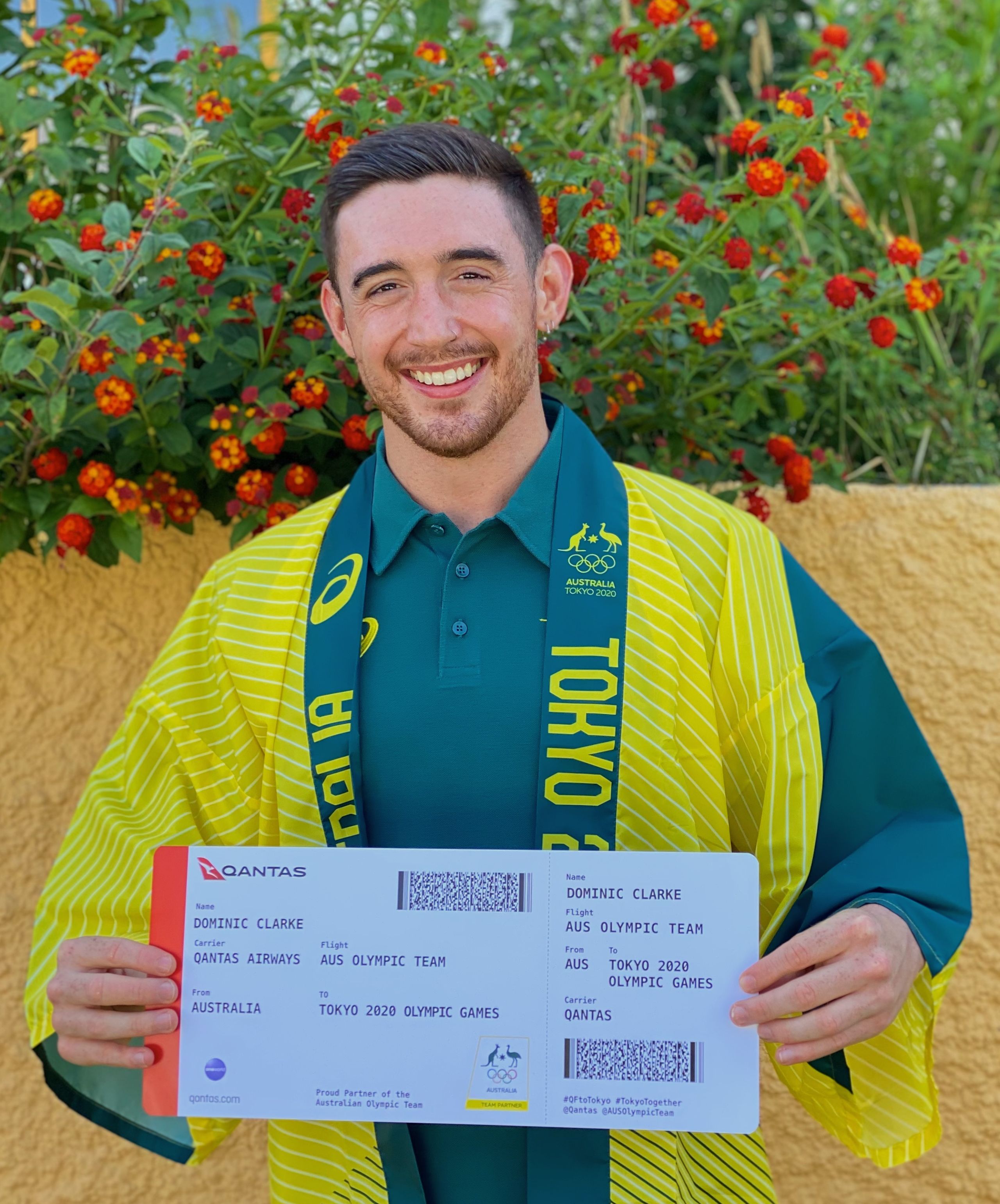
Dom Clarke with his official 'ticket to Tokyo' as part of the Australian Olympic Team
Dom Clarke with his official 'ticket to Tokyo' as part of the Australian Olympic Team
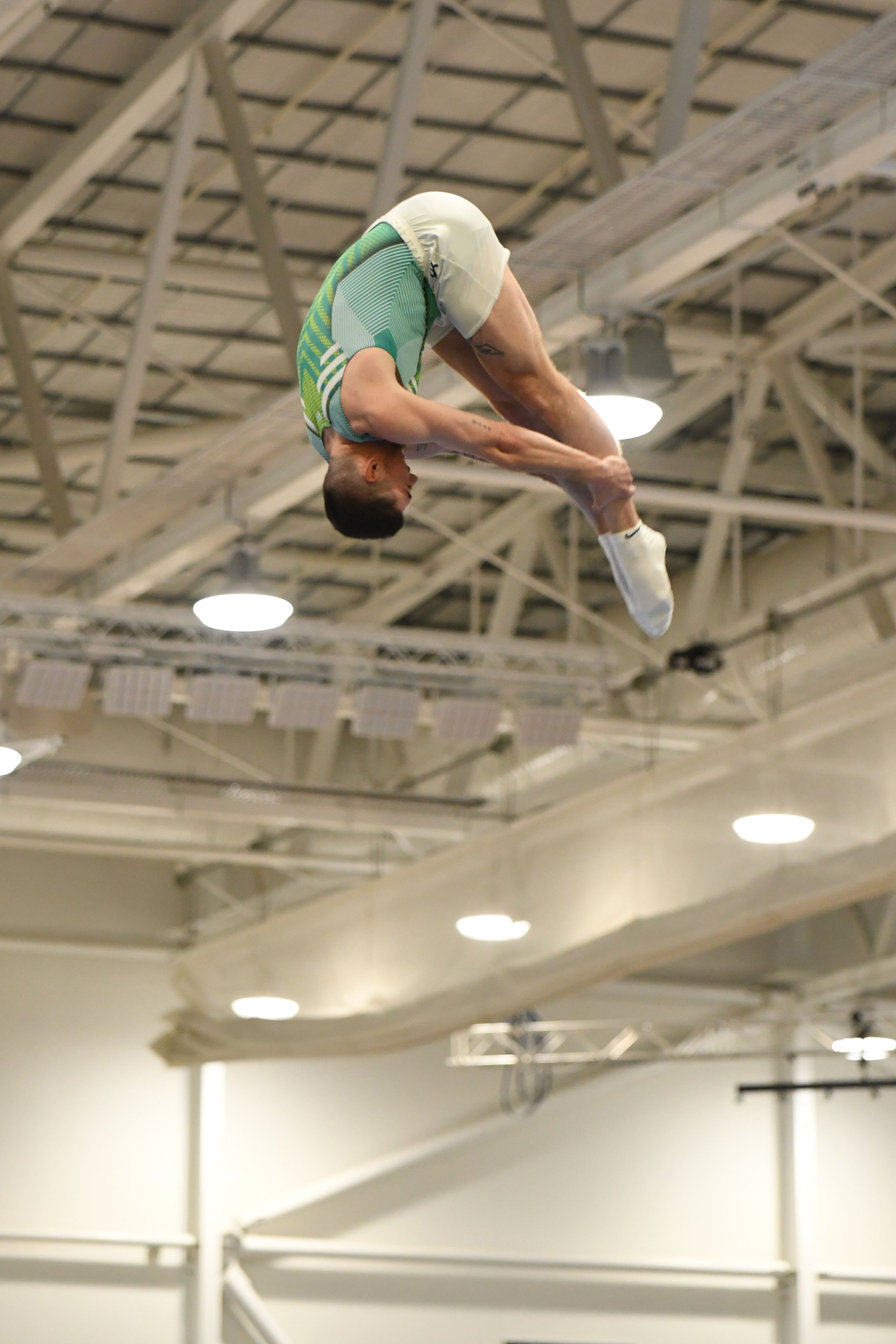
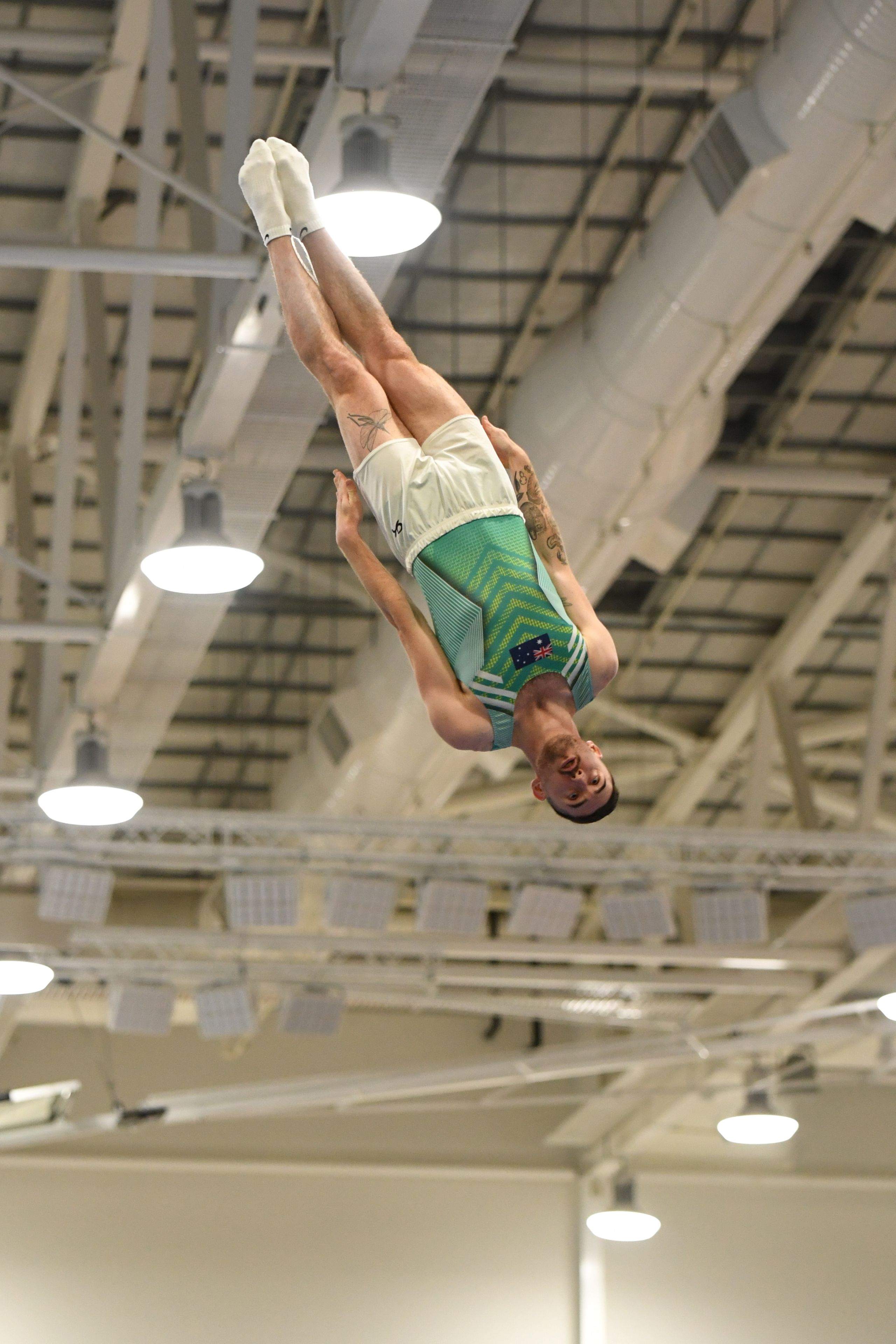
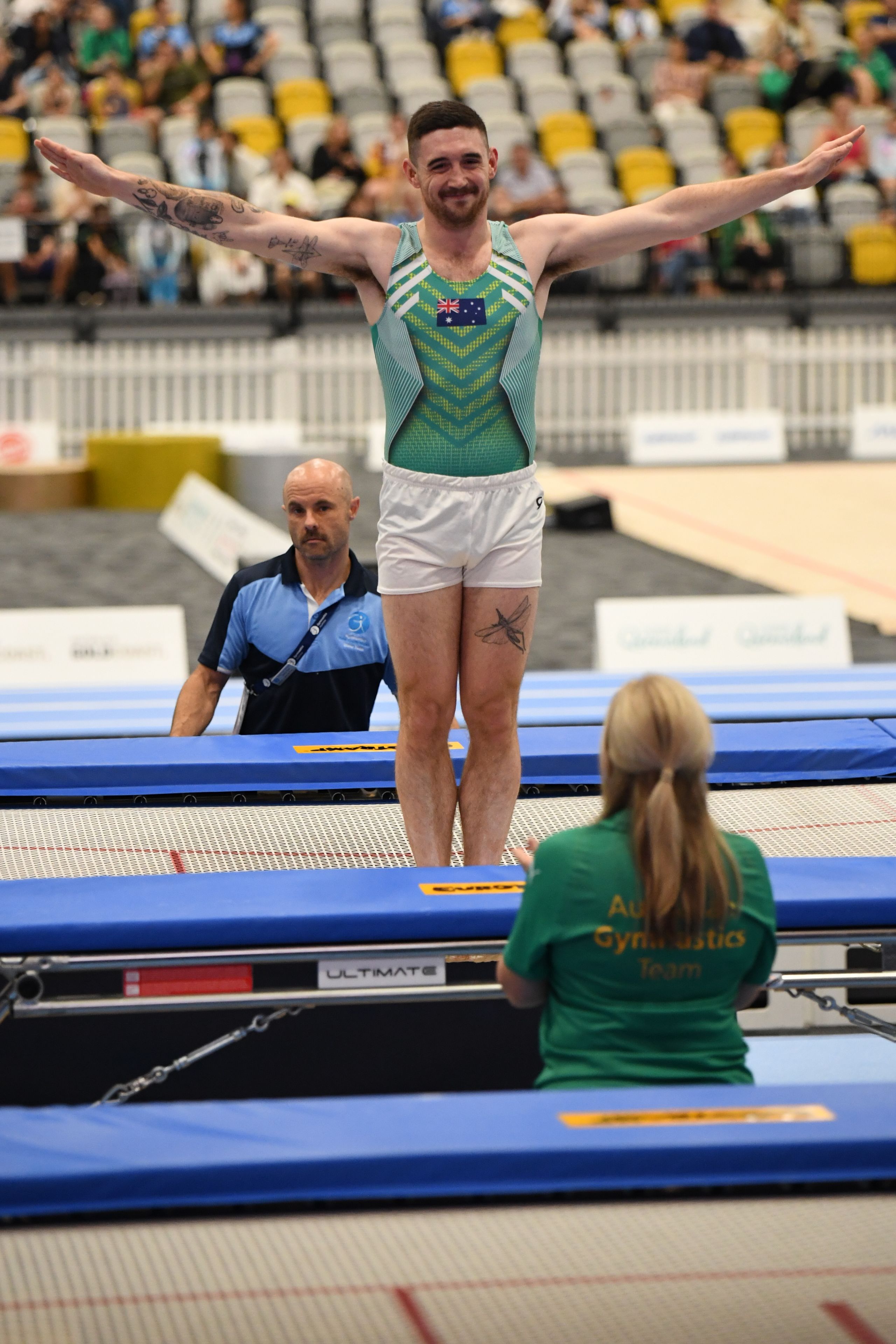
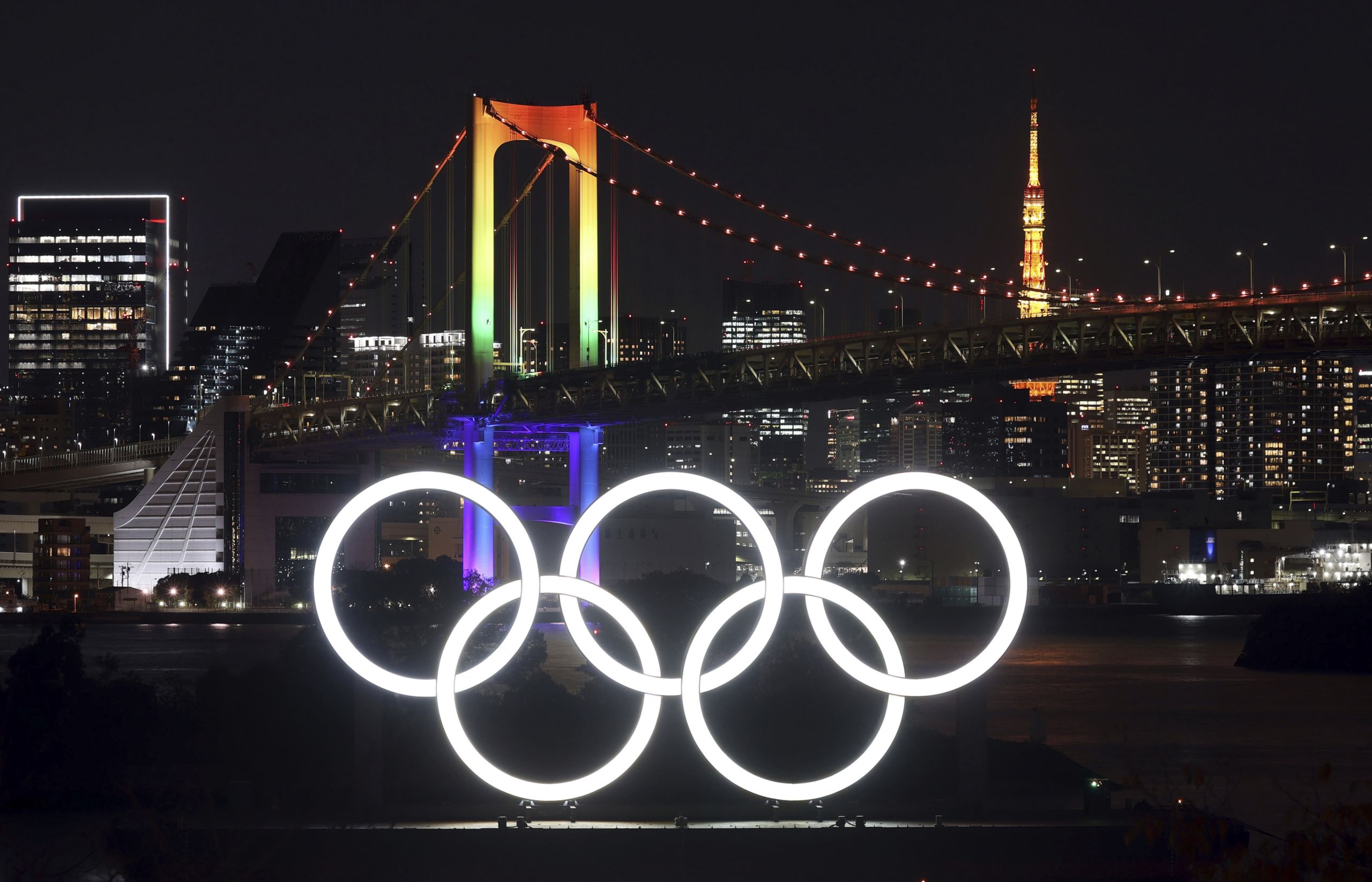
The Olympic Rings are seen on a pontoon in front of Tokyo's Rainbow Bridge on the Odaiba waterfront (Yomiuri Shimbun via AP Images)
The Olympic Rings are seen on a pontoon in front of Tokyo's Rainbow Bridge on the Odaiba waterfront (Yomiuri Shimbun via AP Images)
Genuinely changing the Games
It might sound like a lofty ambition for an athlete - that by bringing your whole self to elite sport, authentic and unapologetic, you could transmit an air of confidence that someone else seeks to emulate and that sparks a shift in thinking on equality back in their homeland.
Tom Daley spoke to this spirit of activism after winning Commonwealth gold for Great Britain in 2018, acknowledging how at that time athletes were competing under the flags of 37 other Commonwealth nations that still held anti-gay laws on their statute books. "We have to talk about these things and shine a light on them in order to get change," he told the BBC.
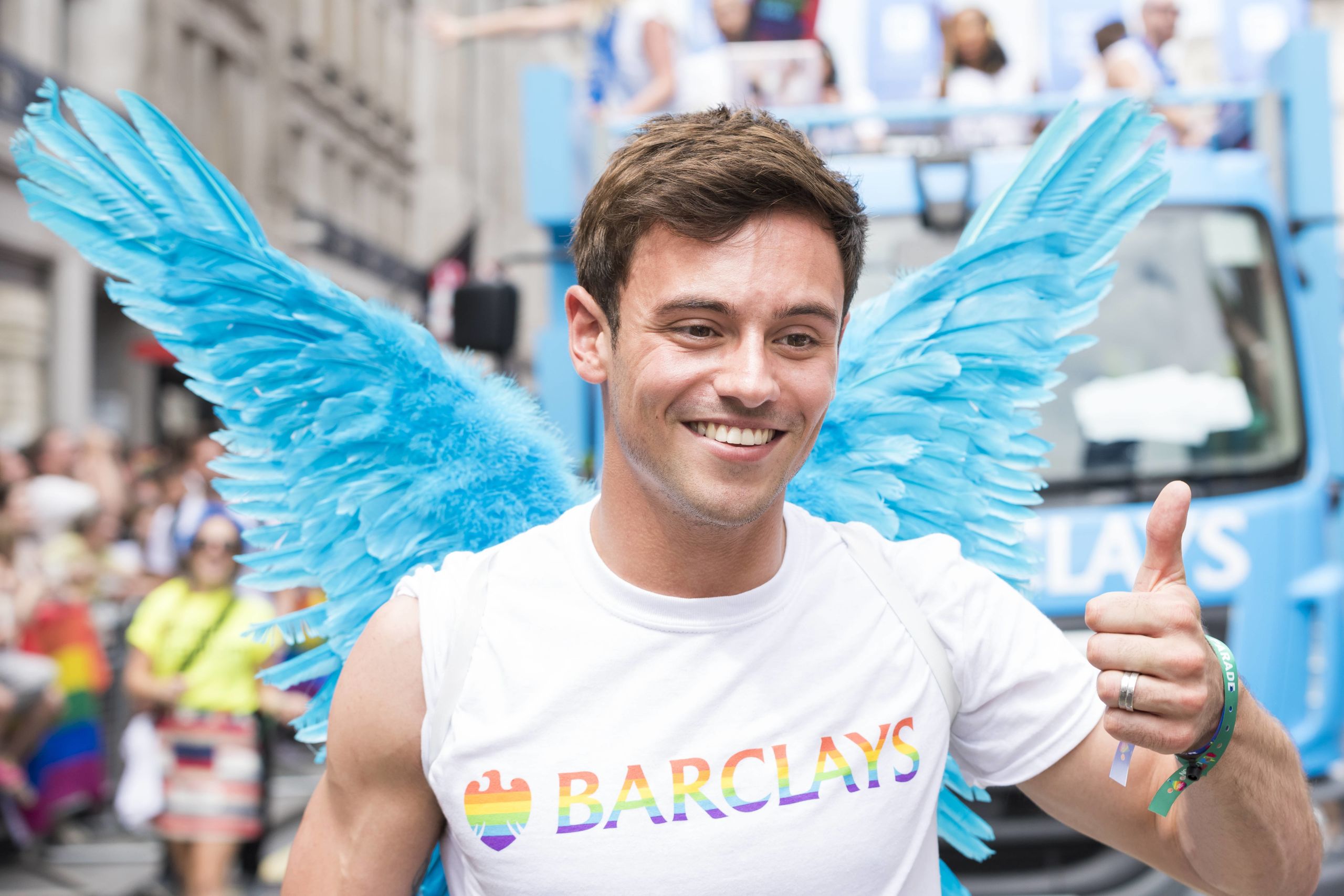
Tom Daley at Pride in London 2017 (Ik Aldama/dpa/AP Images)
Tom Daley at Pride in London 2017 (Ik Aldama/dpa/AP Images)
Measuring progress is not a simple numbers game, however. In the last three years, only one of those 37 - Botswana - has overturned its discriminatory, colonial-era legislation and on a global scale, there are 71 countries in total where gay sex remains criminalised. Meanwhile, since Rio 2016, seven more national governments now legally recognise same-sex marriage (and Chile is poised to be the next) - but several other regimes have actually changed their constitutions to explicitly define marriage as being for opposite genders only.
Kate and Helen Richardson-Walsh made history in Rio as the first same-sex married couple to compete together at an Olympics. Their story was told around the world, and it had the happiest possible ending as they struck hockey gold alongside their GB team-mates.
For Sarah Jones and Leah Wilkinson, part of the current crop in Tokyo and in a long-term relationship, it's about writing their own chapter - but one that also conveys the message that LGBTQ+ inclusion helps to deliver medals.
"Kate and Helen are role models of ours," says Wilkinson, "and we've both been lucky enough to play with them too - they're absolute heroes. Hopefully, there's space where we can help to create a bit of a legacy too and be role models for other people."
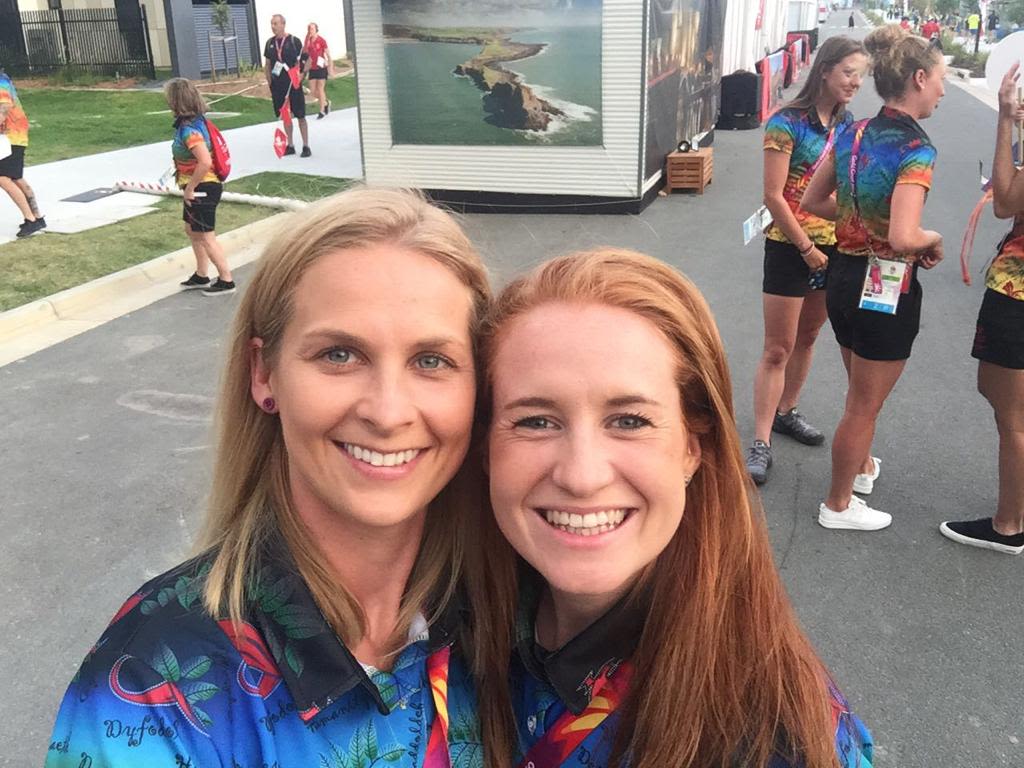
Leah Wilkinson and Sarah Jones will go for gold as part of the reigning Olympic champions' current squad
Leah Wilkinson and Sarah Jones will go for gold as part of the reigning Olympic champions' current squad
They intend to get married when the pressures of the pandemic have eased off - "wedding planners, get in touch!" says Jones - and in their hockey sphere, being a couple is special but somehow unremarkable at the same time.
"It would be weird for me to not do things alongside Leah," she adds. Her fiancée nods in agreement: "It's an odd one because it almost hasn't been a challenge."
Jones and Wilkinson say their experiences in hockey have always felt welcoming and LGBTQ+-inclusive
Jones and Wilkinson say their experiences in hockey have always felt welcoming and LGBTQ+-inclusive
Women's team sports make up the bulk of the LGBTQ+ representation at Tokyo 2020 - soccer has provided the names of more than 40 female footballers for the Outsports list, with many players regularly sharing news of their relationships and life events on social media.
Similarly, for Jones, there was a natural visibility in her sport that put her at ease from a young age. "I probably didn't know it at the time but when I saw lots of people around me that looked a bit like me and clearly loved in the same way that I did, I just felt at home. It probably didn't click until a lot later that that was one of the reasons why.
"Throughout my hockey journey, whatever club or environment I've been in, I've felt that. That's testament to how inclusive hockey is."
"Hopefully we're getting closer to being able to be more open in all sports... hockey is fantastic and other sports should learn from the work it does."
Leah Wilkinson, Team GB hockey
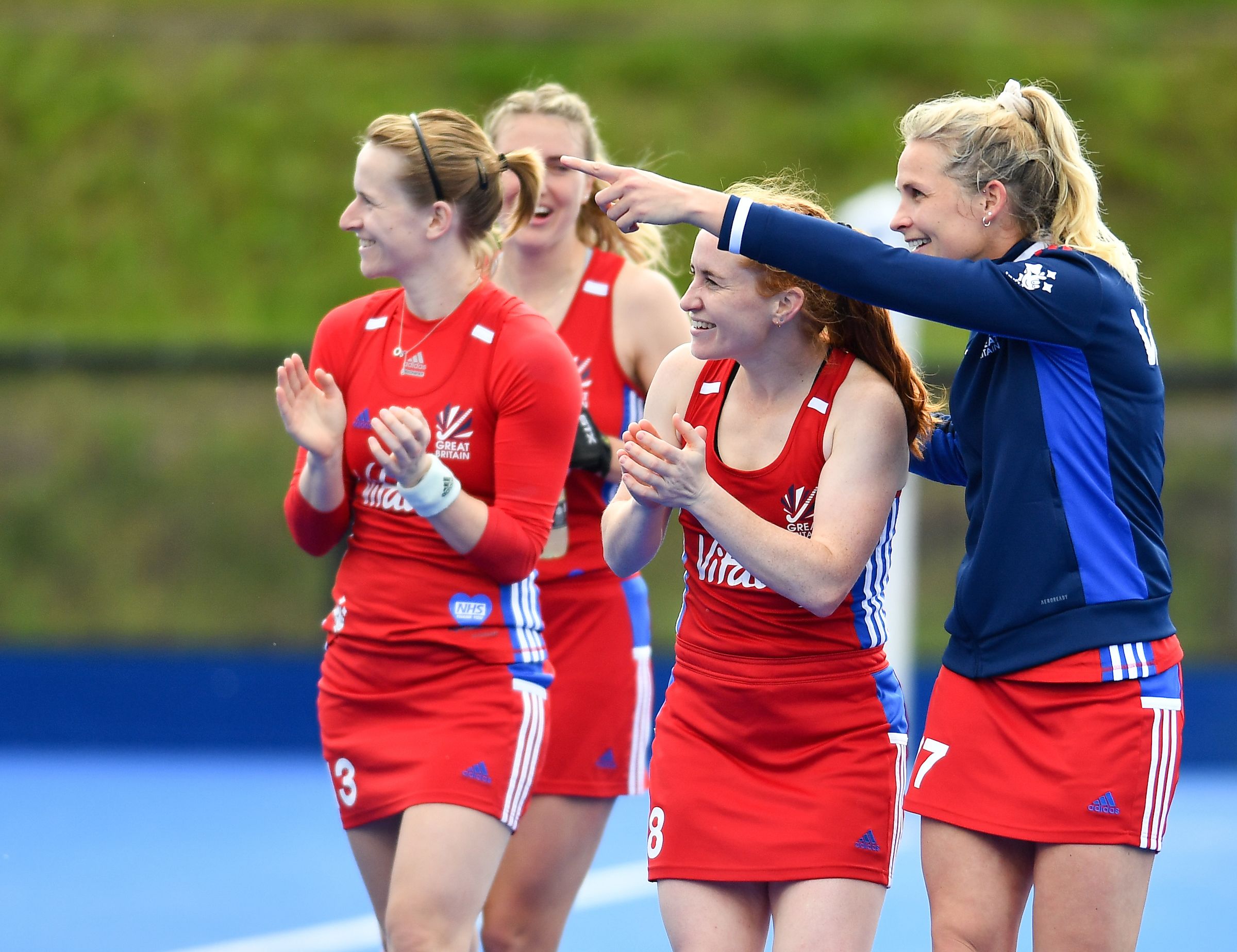
New narratives, and slow-moving stories
The major LGBTQ+ landmark for Tokyo 2020 is undoubtedly the visible presence of trans athletes for the first time. In the women's +87kg category in weightlifting, New Zealand's Laurel Hubbard is one of 14 entrants, while footballer Quinn - who came out as non-binary trans in 2020 - is looking to go better than the bronze they won with Canada in Rio.
Trans athletes have been allowed to compete in both the Olympics and Paralympics since 2004, but Hubbard is the first trans woman to qualify under the rules of her sport, determined by the International Weightlifting Federation in line with IOC guidance last updated in 2015.
Her performances at the Tokyo International Forum on August 2 will inevitably be scrutinised, as will the reactions of her rival lifters, their coaches and federations.
IOC president Thomas Bach told a pre-Games press conference that the Committee is in an ongoing "inquiry phase" with regards to trans inclusion, revisiting its rules with a view to issuing updated guidelines in the future. Bach emphasised: "This is a question where there is no one-size-fits-all solution. It differs from sport to sport."
In an Instagram post after Canada's 1-1 draw with Japan, in which Quinn made Olympic history, they wrote of their pride and pragmatism.
More talking points tumble out from the Tokyo LGBTQ+ list as you drill down into the diverse backgrounds of its athletes. By nation, the US has the most out entrants with over 30 so far, followed by Britain, Canada and the Netherlands with 16 each, then Brazil, Australia and New Zealand who are all also into double digits.
However, there is a noticeable lack of representation of Asian athletes in the list, and none from Japan. It's been a frustrating build-up to the Games for human rights campaigners in the host country, where the ruling conservative government failed to deliver hoped-for equality legislation. Pride House Tokyo, a space in Shinjuku dedicated to diversity that will have legacy as a permanent LGBTQ+ centre, is raising awareness of the fact that no national protections currently exist for Japanese citizens on the basis of their sexual orientation or gender identity.
Amazin LeThi is an athlete activist and global ambassador for multiple sports and equality organisations whose work focuses on the inclusion of Asian and LGBTQ+ athletes. She is heartened to see Philippines skateboarder Margielyn Didal providing visibility for her communities but wants people to consider why this is noteworthy.
"It's a revolutionary act when you see yourself for the first time and to even have one out east Asian athlete at the Olympics is huge," explains LeThi. "Her presence opens the door for others and also creates conversations.
"Asian LGBTQ+ athletes still face many cultural challenges when it comes to being out, particularly those from countries with laws that mean they could face persecution or backlash from society."
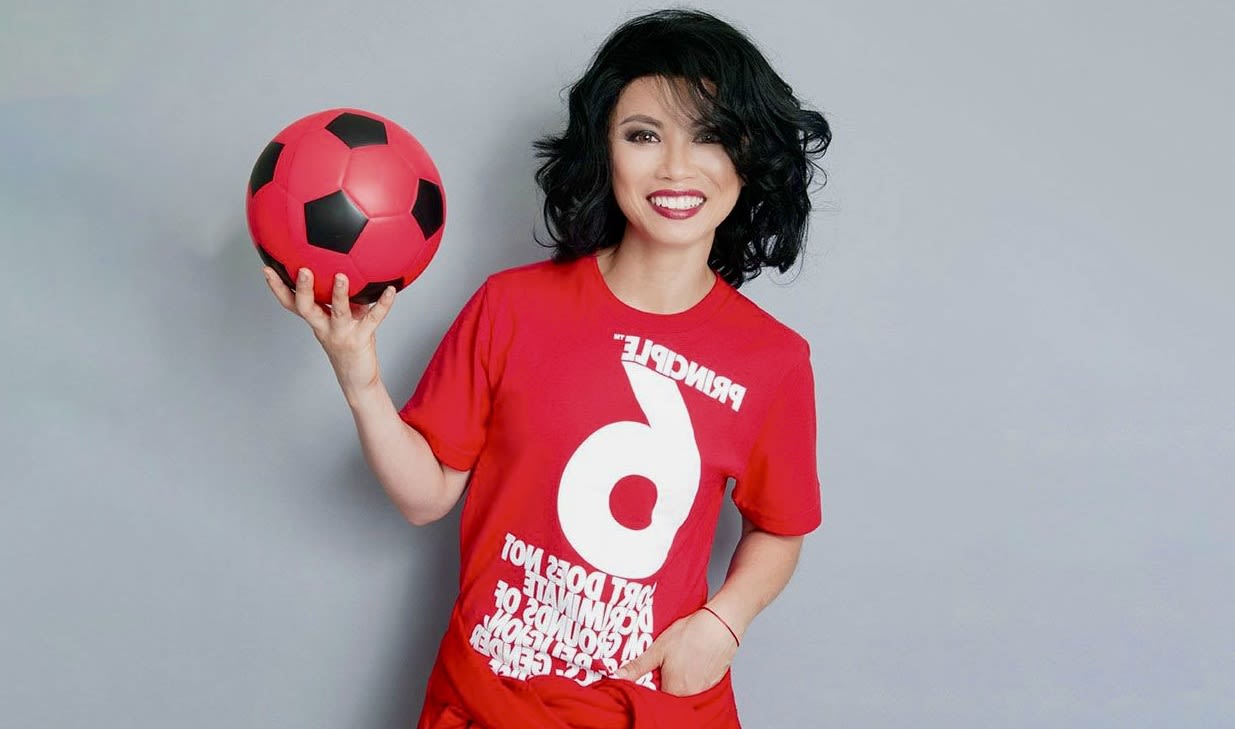
Amazin LeThi is an athlete, keynote speaker, and ambassador to organisations including Stonewall, Pride House Birmingham, and Athlete Ally
Amazin LeThi is an athlete, keynote speaker, and ambassador to organisations including Stonewall, Pride House Birmingham, and Athlete Ally
As Daley demonstrated three years ago in Gold Coast, competing and pushing for change are not mutually exclusive, and LeThi insists the platform provided by Tokyo 2020 must not be passed up.
"These Games present an opportunity for athletes not just to champion LGBTQ+ equality in Japan and Asia but to speak up about the need to create safe and nurturing environments in sports so that more Asian LGBTQ+ athletes can be out.
"But it's not just the responsibility of other athletes to speak out and be allies - we also need support from coaches, sports organisations, and the media. And to have more out Asian athletes competing at the Olympics, we need more Asian athletes to compete across all sports."
Only seven British Asians competed at both the 2016 Olympics and Paralympics in Rio, while five athletes in the current 376-strong Team GB squad for Tokyo 2020 are of East Asian heritage. LeThi says this must be a concern ahead of next year's Commonwealth Games in Birmingham, for which she is a Pride House Ambassador.
"These conversations have to continue as to what we can do at the grassroots and youth academy level so that we're recruiting from a diverse ethnic pool of athletes that reflects the multicultural society we live in.
"I'd like to think that with so many out LGBTQ+ athletes competing in Tokyo, it will encourage others to be out at Birmingham 2022. But over the next year, we really need to look at all the barriers faced by ethnic communities, and what policies and support exists when it comes to tackling racism. Athletes from the Asian and black communities face multiple layers of discrimination which creates obstacles to being out."
Recently, several UK sports governing bodies have launched or supported LGBTQ+ and allies networks. These forums are fostering community among athletes, coaches and administrators, exploring how mental health relates to performance, and prompting dialogue on intersectionality - how inhabiting multiple identities shapes an individual's experiences.
For Quansah, it's empowering to not just be seen but to use her voice to advance discussions on Black Lives Matter, the profile of women's sport, or Pride. "I do fall into these categories and there are probably not as many people that do," she says. "If I can be that person others look up to, that's everything.
"I just want to be able to make sure people feel comfortable being themselves and that they are seen on a world stage like this."
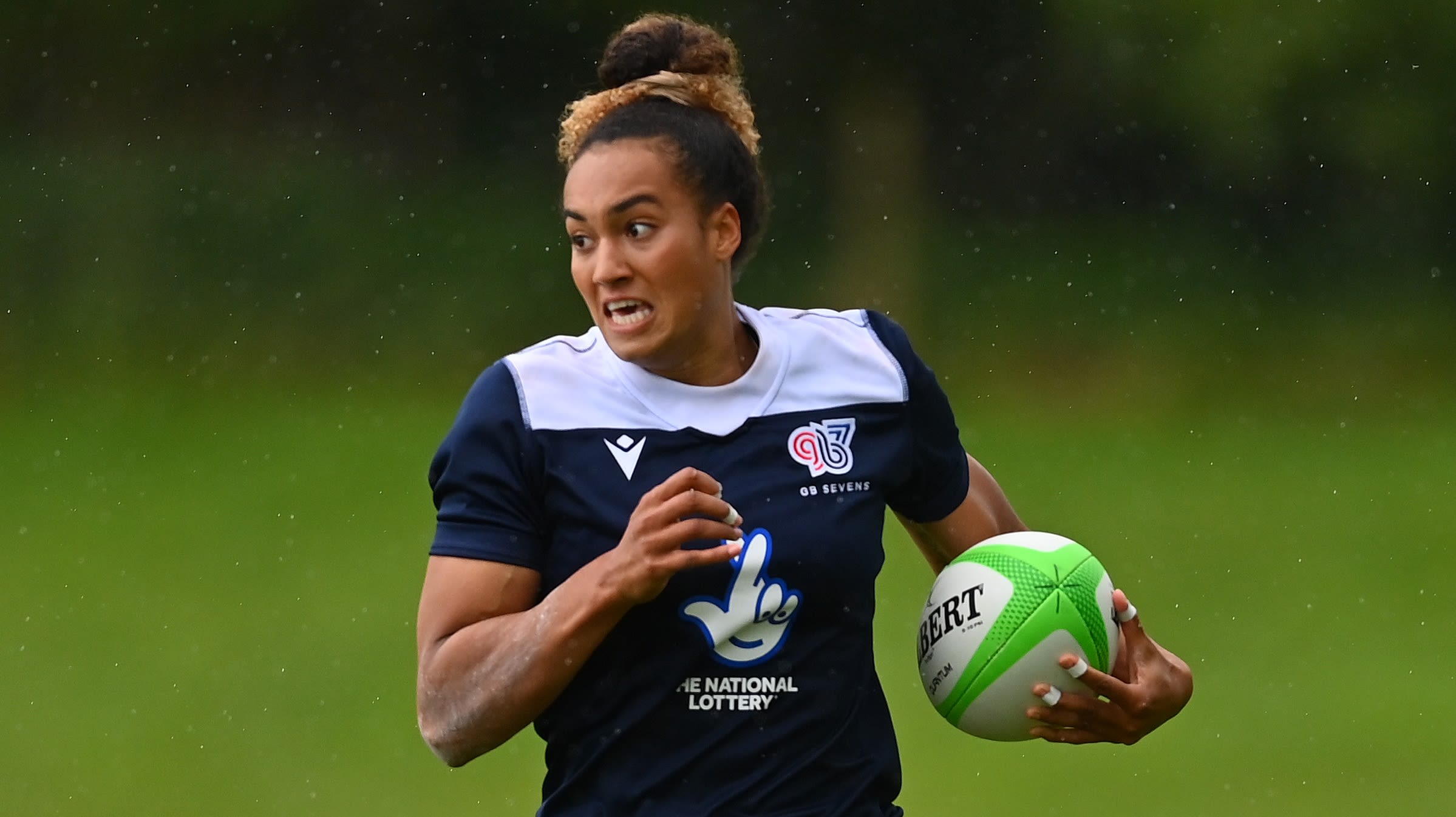
Quansah in action for Great Britain against France in May's International Rugby 7s at St George's Park (Dan Mullan - RFU/Getty Images)
Quansah in action for Great Britain against France in May's International Rugby 7s at St George's Park (Dan Mullan - RFU/Getty Images)
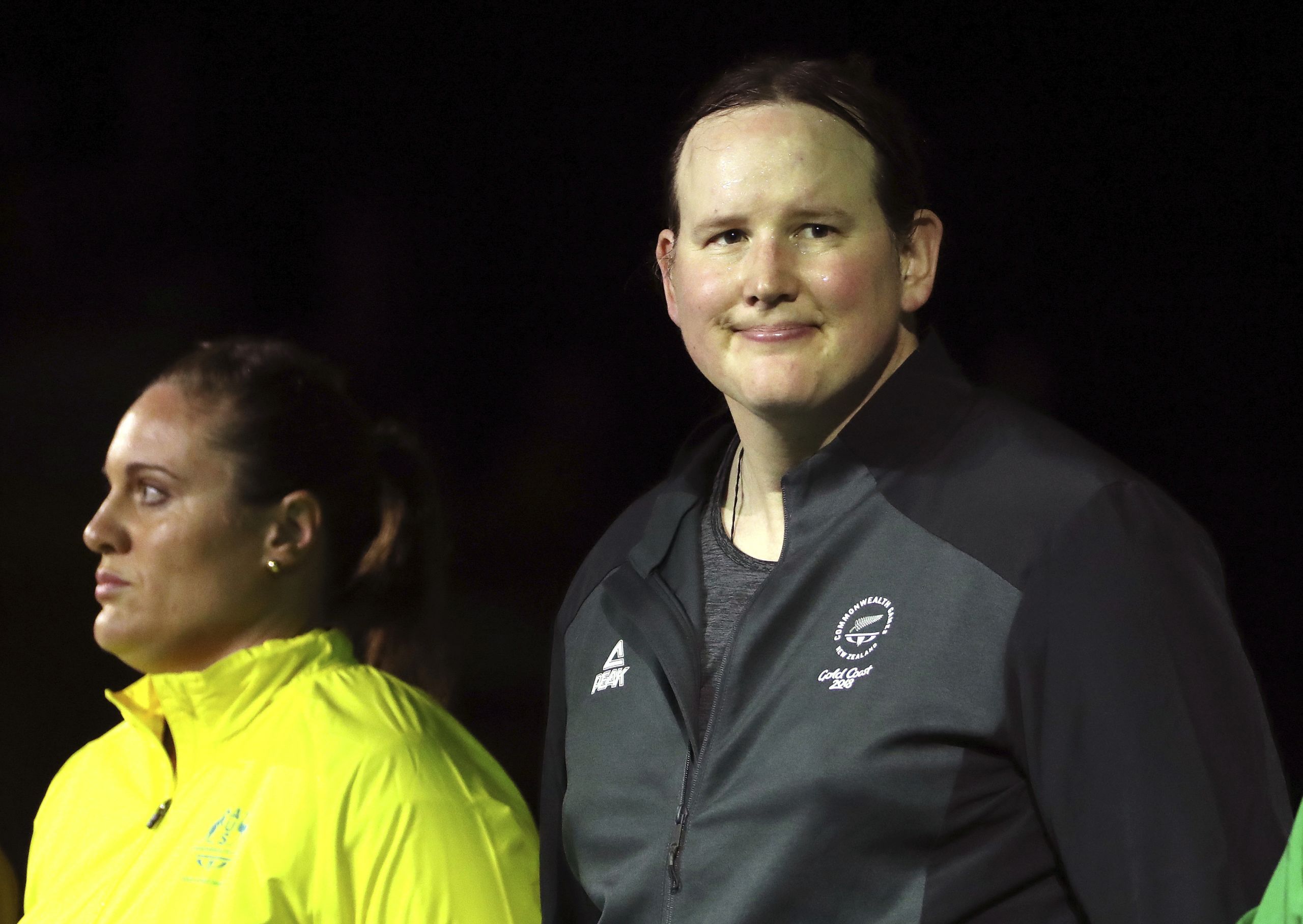
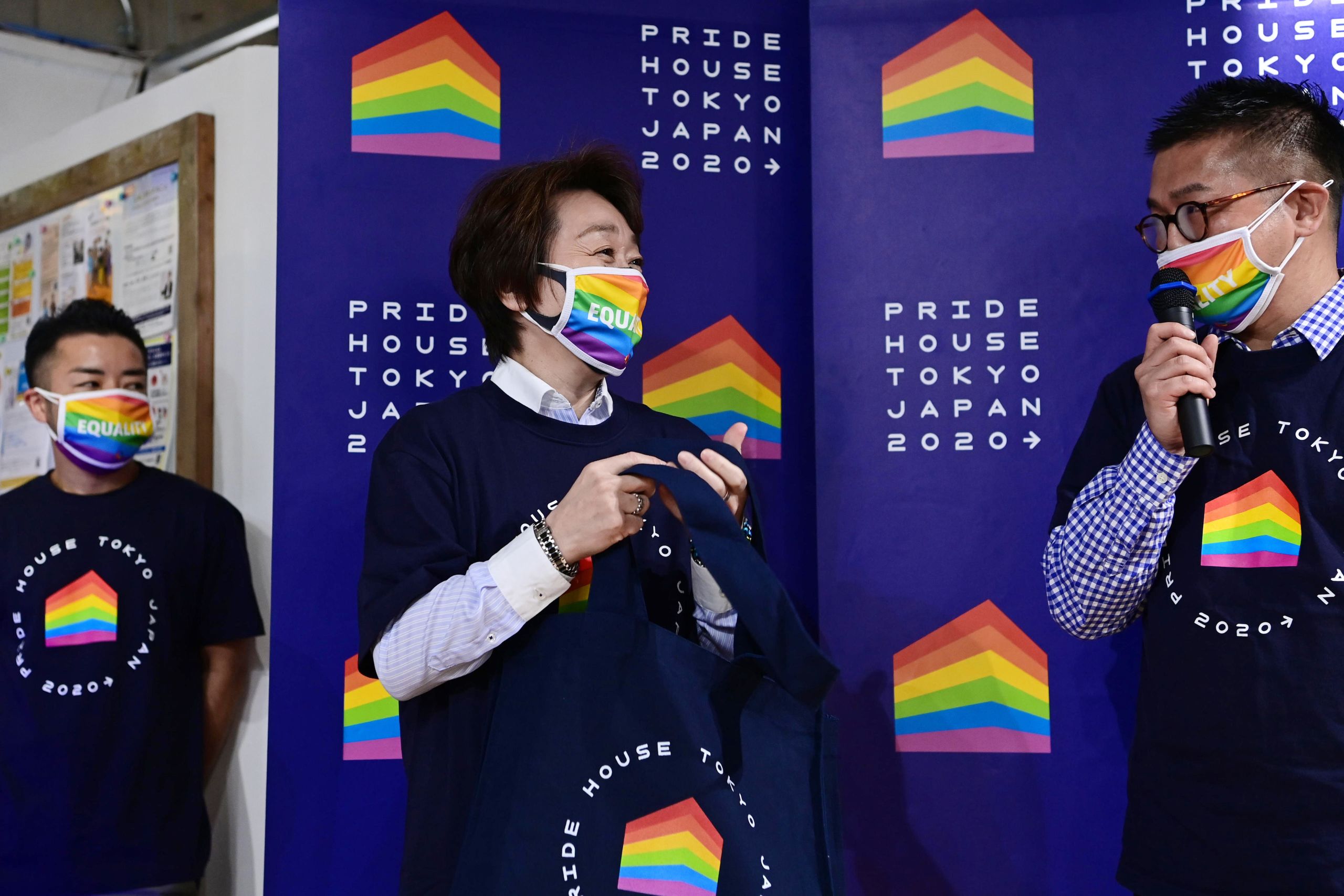
Striving for excellence, and adding 'sparkle'
Clarke's sole focus is to "flip into the final" at the Olympic Gymnastic Centre on July 31, but if there is any subtext to his somersaults, it would be to make his sport more accessible. Communicating outside of competition through social media - passions (travel, cuisine), personality (he once played Macavity in a touring production of Cats), future ambitions (joining Cirque de Soleil) - shows his character traits as well as his physicality.
"For me, authenticity is as much about breaking down stereotypes of high-performance athletes - what their bodies should look like, and what training looks like. There are highs and lows, my body fluctuates, and there isn't really a perfect body type.
"Also, in our sport, you get stereotyped growing up - all male gymnasts from a young age who say, 'I do gymnastics' find that their peers say, 'that's a feminine sport, that's a gay sport'. That creates a hypermasculine culture where gymnasts want to flip the stereotype completely.
"So as a queer gymnast who gets stereotyped and told 'oh, you're gay', I reply, 'well yes, not because I do gymnastics, but because I'm actually gay' - but it's confusing and isolating. It makes it really challenging for young queer gymnasts coming out or other athletes within those respective sports that still have those stereotypes around them, such as diving or figure skating."
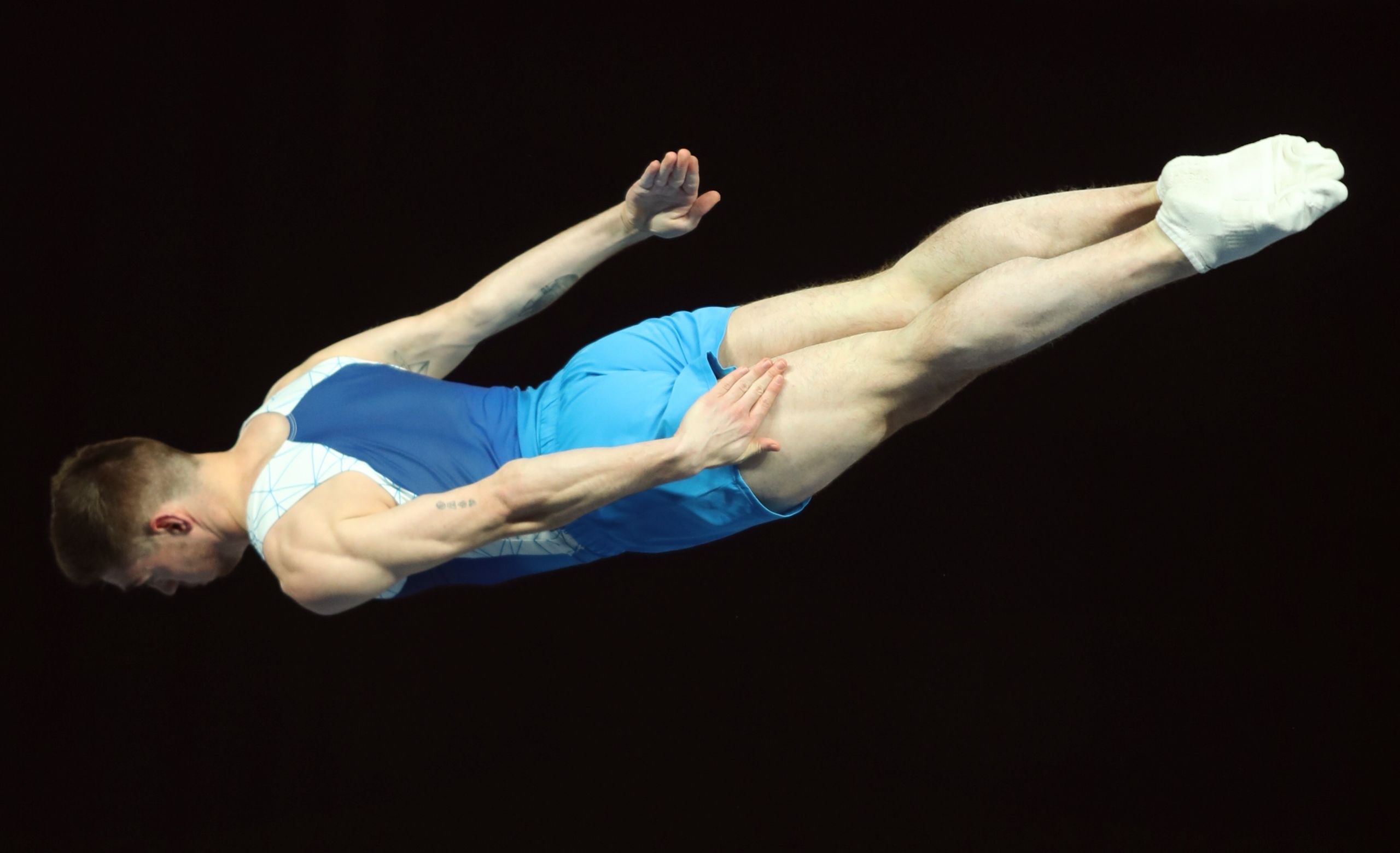
One male athlete who features on the published Outsports list posted to his Instagram story to say he was "not happy" to be named there. Clarke can understand that reaction. "It varies from athlete to athlete. You want to let your sport speak for yourself and maybe then let people see you for your sexuality after.
"Maybe they think it will affect how they're seen as an athlete, especially with more artistic sports where you get scored by judges.
"But I think to have a list is really cool because you have the word 'out' in there - it's about record numbers of out athletes, and it shows how we're moving forwards in the sports and inclusion space.
"More than anything, we need to let out athletes tell their own stories because that inspires younger LGBTQ+ athletes to think 'that's a very similar storyline to me - maybe I can be an out athlete like that one day.'"
Clarke says authenticity is a particularly powerful quality for LGBTQ+ athletes and develops for everyone over time
Clarke says authenticity is a particularly powerful quality for LGBTQ+ athletes and develops for everyone over time
Crucially, these stories are heavily skewed towards success. 47 per cent of out LGBTQ+ athletes at Rio 2016 won medals, up from 40 per cent at London 2012. Depending on your viewpoint, this might be the most eye-opening statistic of all - but Clarke is not too surprised.
"I can see why LGBTQ+ athletes would be successful because we're extremely stubborn! It's an individual thing, though - some may feel they have something to prove, and that comes from a different place.
"I know from myself and from other gay gymnasts that we've got a little bit of flair, a little bit of pizzazz. I'm quite well known for my execution on the trampoline - I have a nice style, and that reflects well with the judges. That comes down to my personality and part of that is being queer.
"I'm not saying heterosexual identifying athletes don't have that, but you look at the guys I mentioned - Matt Mitcham, Tom Daley, Ji Wallace - I feel there's some added sparkle there.
"I'd say that to anyone though - you'll be really surprised at how well you do when you're being more yourself and enjoying yourself more."
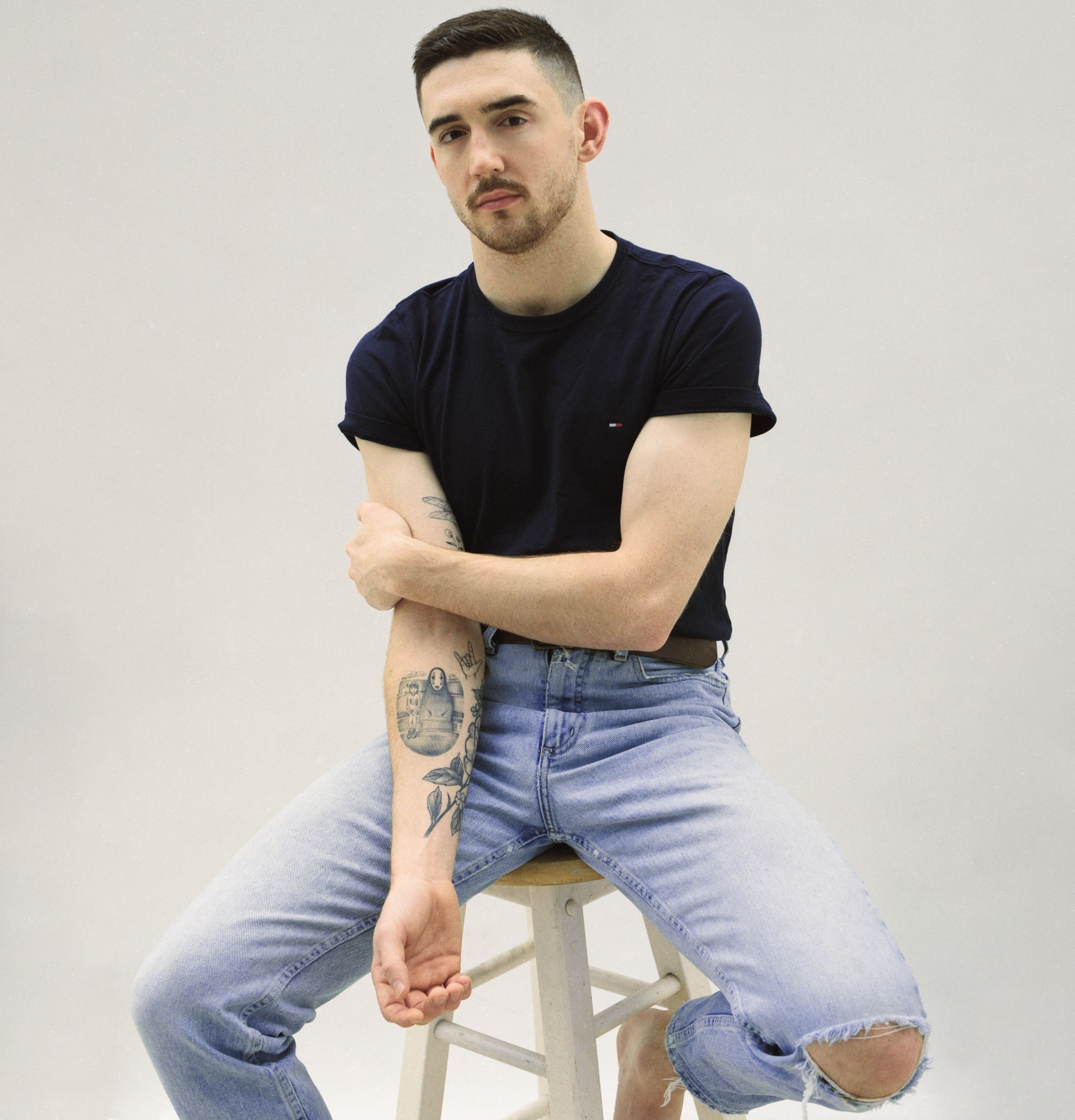
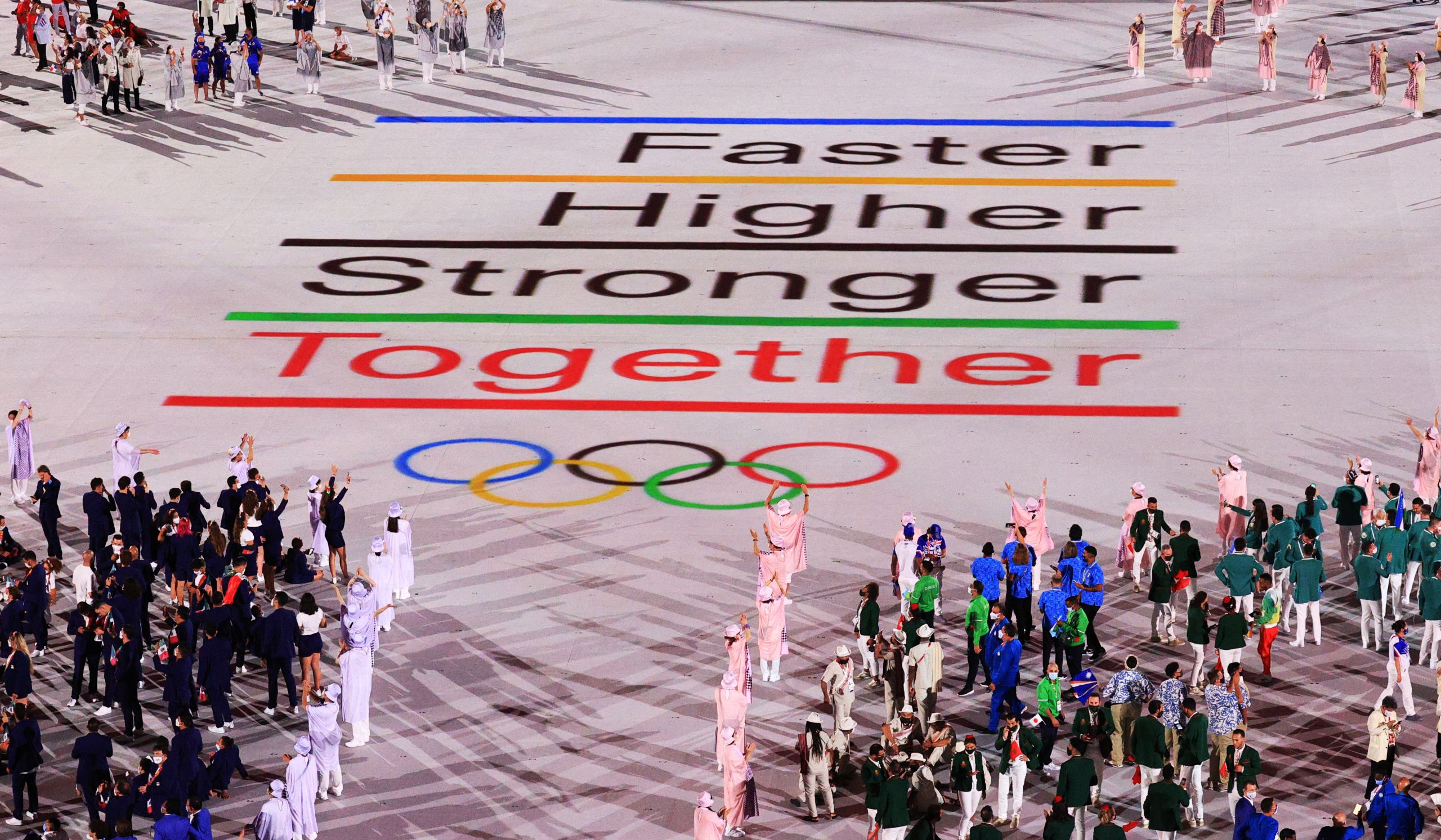
The Olympic motto is seen at the end of the Opening Ceremony of the 2020 Games at the National Stadium in Tokyo (Sergei Bobylev\TASS via Getty Images)
The Olympic motto is seen at the end of the Opening Ceremony of the 2020 Games at the National Stadium in Tokyo (Sergei Bobylev\TASS via Getty Images)
The IOC recently amended its original 19th-century motto of 'Faster, Higher, Stronger' to add another word - 'Together'. Amid the grip of the global pandemic, a pledge for greater solidarity underlines the power of sport for social change.
Recently adopted into the Olympic Charter is a non-discrimination clause that includes specific mention of sexual orientation. Meanwhile, the latest Olympic Agenda - the IOC's strategic vision for the next four years - places gender equality and human rights as destinations on the roadmap.
In a divided world, it's beyond the remit or the capacity of the Olympics to ensure every LGBTQ+ athlete has access to the potential performance boost that true authenticity offers. However, representation at these Games can certainly introduce the possibility of this concept to more people around the world.
Perhaps that's an ambition reflected in the motto of Tokyo 2020 itself - 'United by Emotion'. By encouraging empathy and celebrating pride, sport can give everyone everywhere the freedom to dream.
By Jon Holmes
Sky Sports is a member of TeamPride which supports Stonewall's Rainbow Laces campaign. Your story of being LGBT+ or an ally could help to make sport everyone's game. To discuss further, please contact us here.


